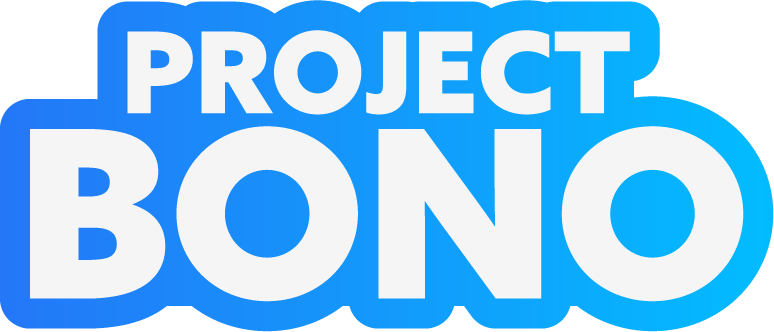
Vaping Causes Distrust, Disruption, and Distraction in Schools.
Project Bono
It’s no secret that an overwhelming amount of students in high schools and middle schools are caught with vape paraphernalia each day as nicotine use continues to rise among youth.
According to the Center for Disease Control & Prevention (CDC), 1 in 35 students at the middle school level have reported to have used an electronic cigarette in the past 30 days. That number increases to 1 in 9 students once they reach the high school level.
When students are asked if they use nicotine, there is a self-incrimination bias. Whether it’s vaping, smoking, chewing tobacco, or something else. The bias may arise as a result of peer pressure or a fear of disciplinary action. Which could prevent them from getting the guidance they need.
In an effort to improve the outlook of students, faculty and legislators across the globe are rightfully cracking down on substances in schools. However, are current disciplinary efforts effective when first-time offenders are betrayed by their school administration, sent straight through the court system, and given a few days off? What effect does this have on their mental health, academic performance, their relationship with their family, and quality of life at home, as well as their motivation over the long term?
Distrust
By resorting to threats and fear-mongering instead of offering guidance and compassion, schools and local governments build distrust.
Some communities have local ordinances requiring schools to report students suspected of possessing substances and paraphernalia immediately to the police; others, on the other hand, may have their own discipline policies, which may include contact with parents, in-school suspension, correctional education, and bans from school events like homecomings, proms, sporting events, and commencement ceremonies.
When parents and police are contacted for first-time offenders, the student who is suffering from an addiction to nicotine, feels betrayed. Students are often told that school is there to provide help, guidance, and understanding. However, this is not always promised. This can deter students from seeking support out of the fear that they will be looked at negatively by their teachers and parents, reported to the authorities, or become the target of a stop-and-frisk by the school’s security or administration. This can make a student anxiously fall deeper into their addiction and influence sneaky behaviors.
Disruption
When a first-offender is suspended and reported to the local authorities, their life becomes disrupted.
Suspension from school can put students behind in their academics, and in their eyes, be seen as a reward. Who wouldn’t want a few days off of school? During this time the student can lose a sense of structure and develop poorer habits than before. Parent(s)/guardians may need to take time out of work that they cannot afford to meet with school administrators and local authorities over the course of weeks or months which can cause tension and stress at home.
Suspension from school can put students behind in their academics, and in their eyes, be seen as a reward. Who wouldn’t want a few days off of school? During this time the student can lose a sense of structure and develop poorer habits than before. Parent(s)/guardians may need to take time out of work that they cannot afford to meet with school administrators and local authorities over the course of weeks or months which can cause tension and stress at home.
Distraction
When students return from suspension, they become distracted.
As students attempt to focus on classwork and homework that they are behind due to their suspension, all they can think about is their approaching court date, fines they must work to pay, and their parents newfound perception of them.
Anxiety from academic stress could even be the reason they fell into an addiction in the first place. Additional stress and anxiety can be a gateway into more nicotine use which might influence a repeat-offense or be a gateway to other substances.
Diversion
When students make a mistake for the first time, giving them the opportunity to learn from their mistake is essential for building trust within the school community. Students found in possession of vape paraphernalia will usually be required to attend a correctional education course in nearly every case, regardless of whether they are disciplined at school or by the court. This allows them to understand the harms of continued usage and divert them from making the same mistakes in the future while giving them a second chance.
With this in mind, Project Bono has developed a Nicotine Awareness & Prevention course to assist schools and courts in educating students while also providing enrichment for schools and communities by reinvesting a portion of enrollment proceeds back into the communities that assign our program to their students.
OUR COURSES
Drag to resize

Project Bono provides the most affordable up-to-date online classes that fulfill court and employer mandates while contributing 25% of proceeds towards charitable causes.
SOCIAL LINKS
RESOURCES
-
About Us
-
Print a Referral
-
Example Certificate
-
Where We're Accepted
Drag to resize
SUPPORT
Drag to resize


Copyright © 2024 Project Bono. All Rights Reserved
Money-Back Guarantee
All of our courses are backed by a 30-day money-back guarantee. If your certificate of completion is not accepted, contact us with proof of decline.
We recommend you confirm that your assigner will accept our certificates before you enroll in any of our courses.
Note: Cryptocurrency payments do not qualify at this time.
We recommend you confirm that your assigner will accept our certificates before you enroll in any of our courses.
Note: Cryptocurrency payments do not qualify at this time.
Drugs & Alcohol
MIP
Anger
Truancy
Cannabis
Bullying
Theft
Nicotine
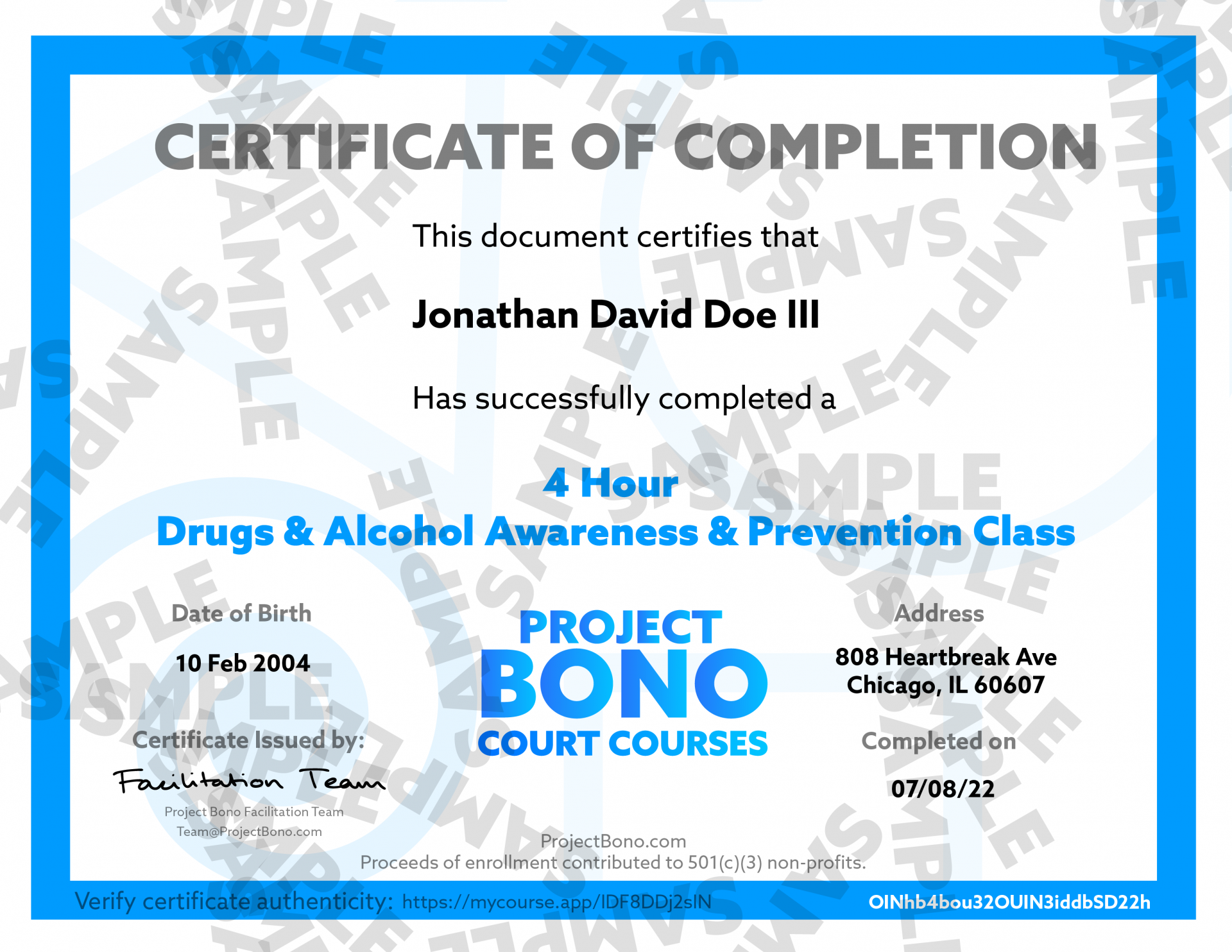
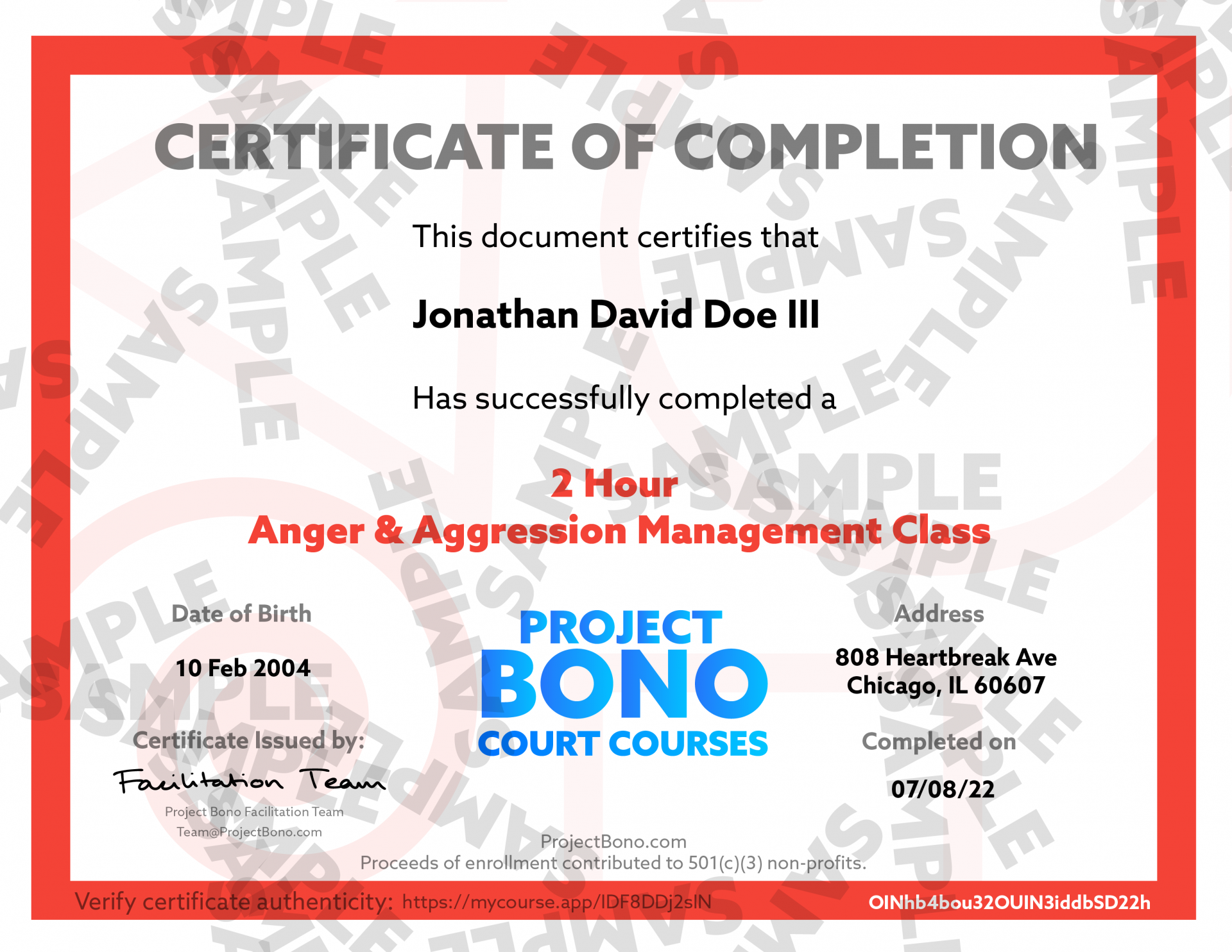
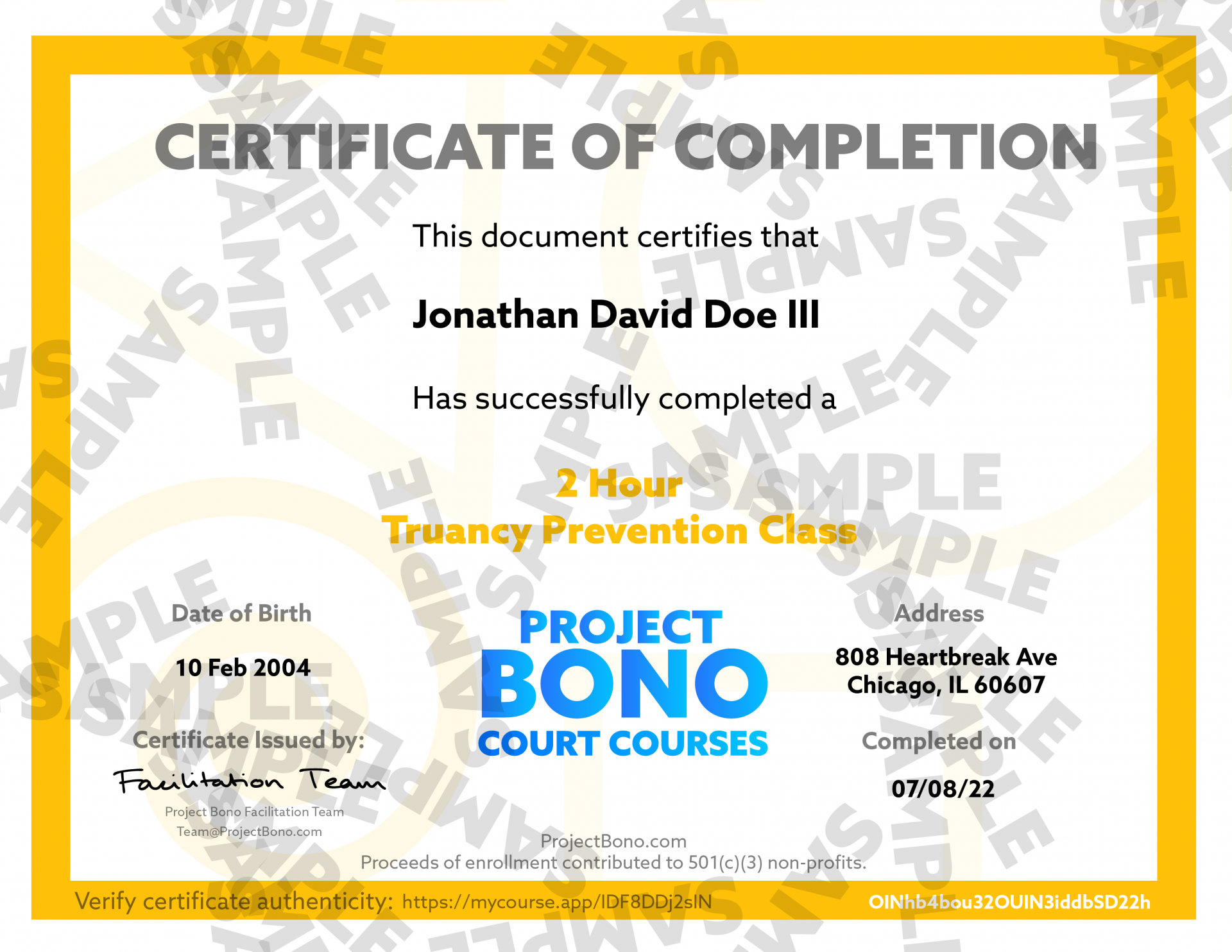
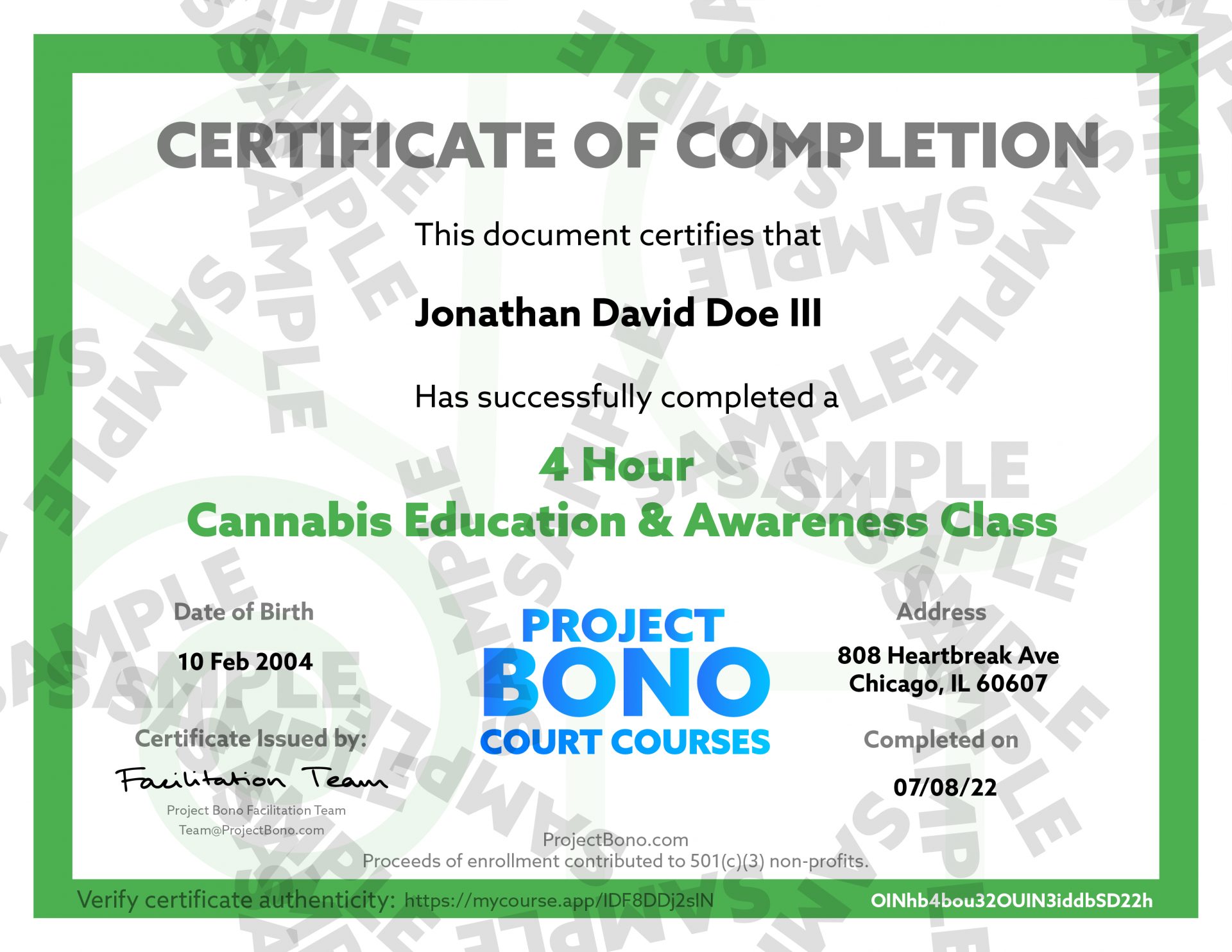
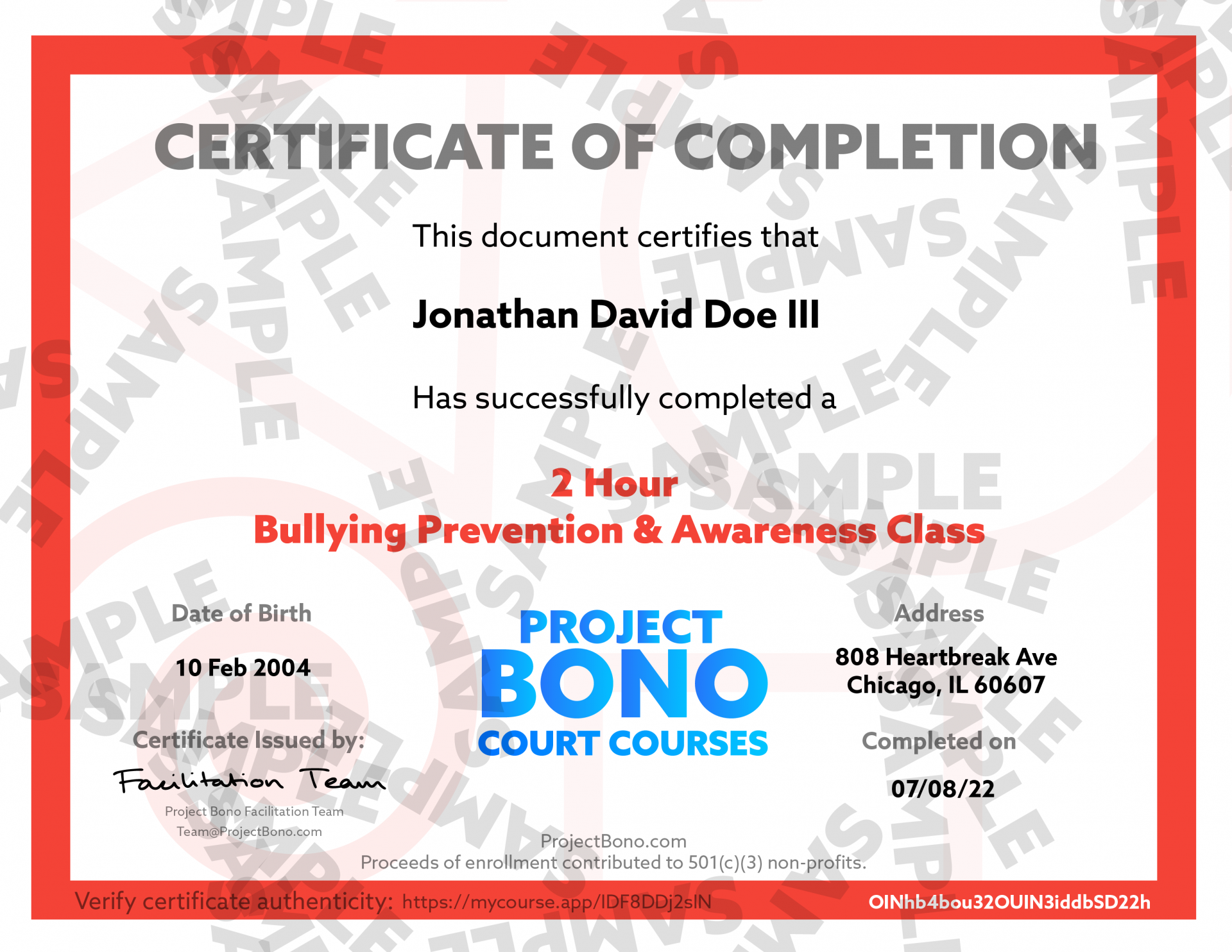
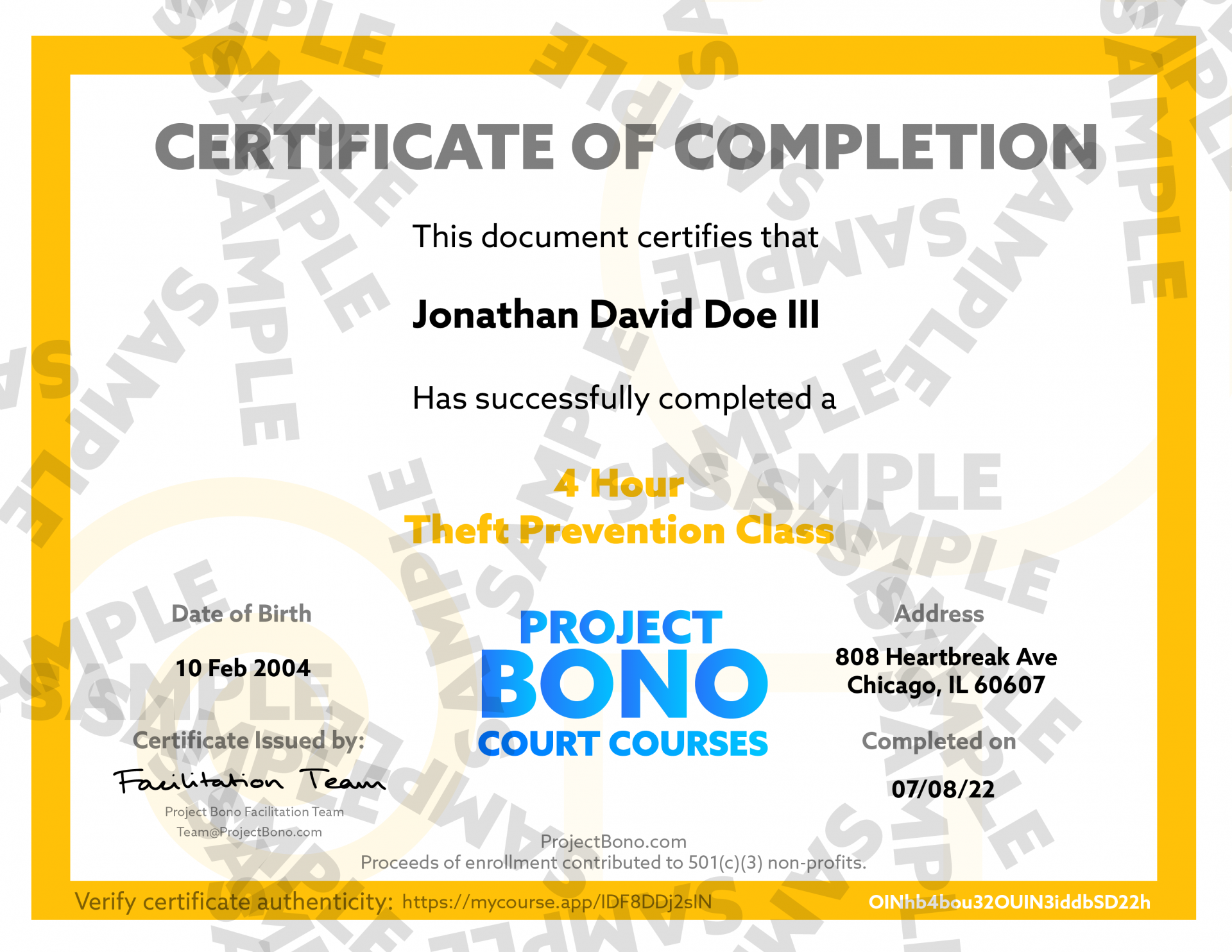
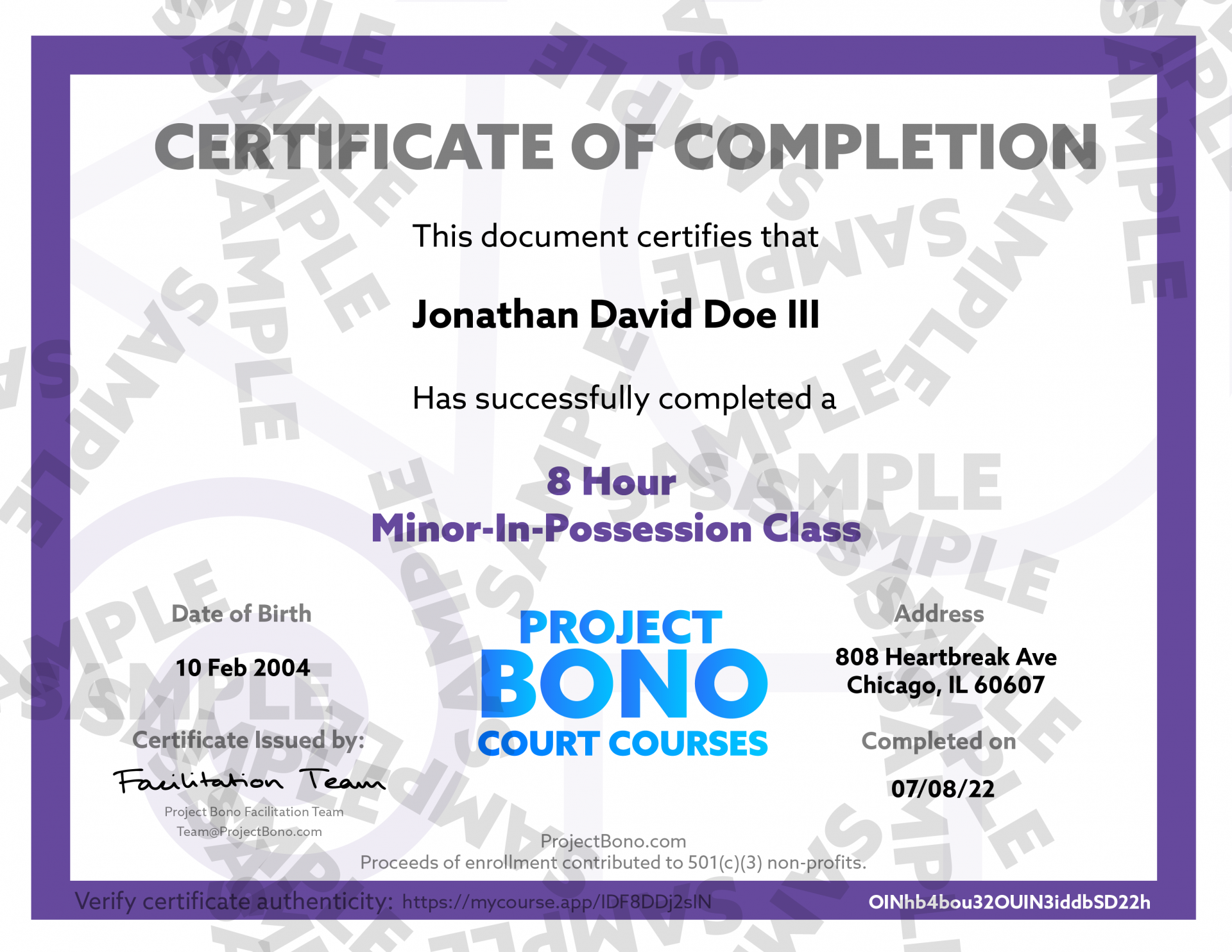
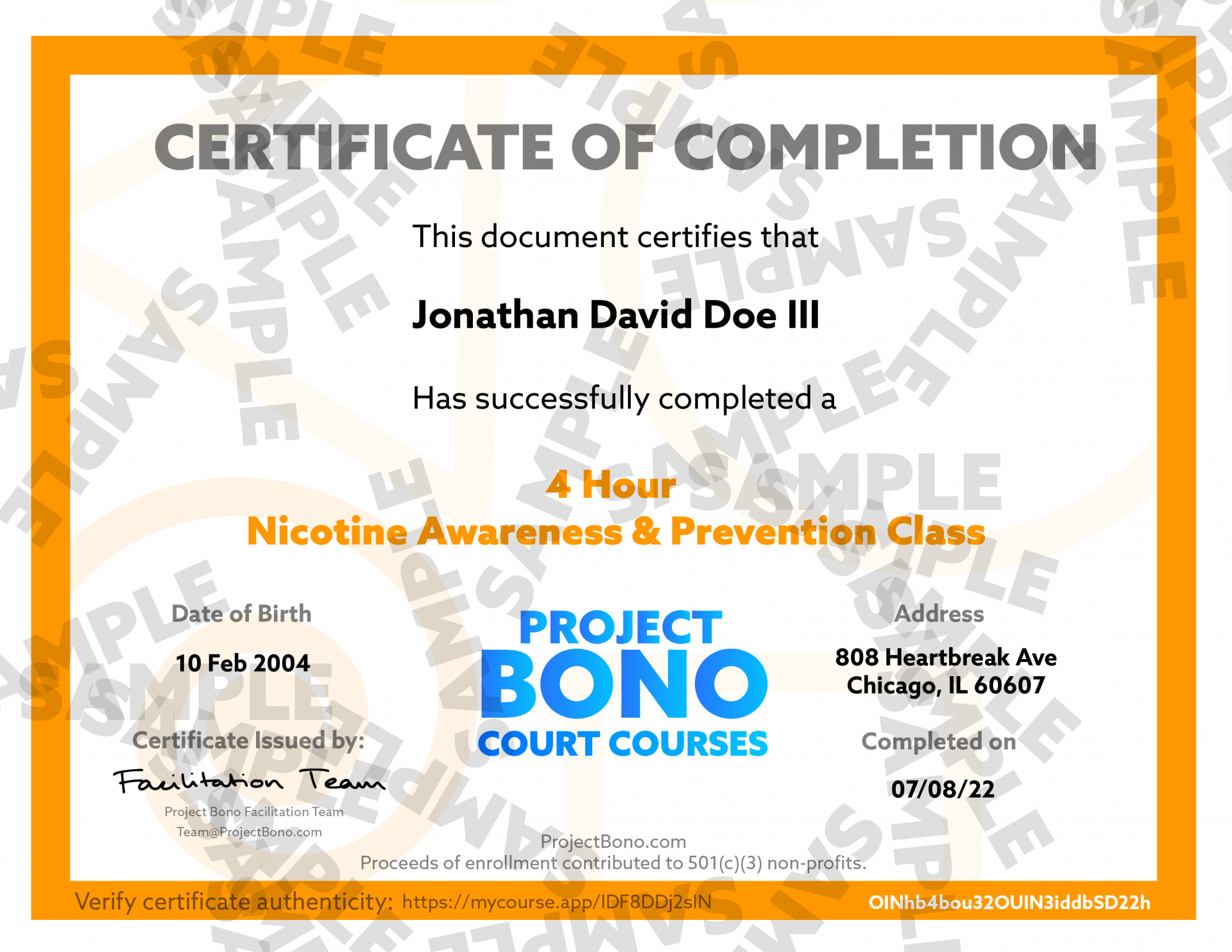
Course updates
Course contents and formatting are subject to improvements.
We are constantly monitoring current scientific and legislative data to provide you with the most accurate information within our courses. When you purchase any of our courses you are entitled to all future versions of the course.
We are constantly monitoring current scientific and legislative data to provide you with the most accurate information within our courses. When you purchase any of our courses you are entitled to all future versions of the course.
PrintableHandouts
Download and print PDF handouts to easily direct students to the correct course and start assigning!
How does Project Bono work?
Project Bono offers correctional education programs that aim to educate first-time and repeat offenders about the risks associated with substance abuse and harmful behaviors.
As you progress through our courses, you'll have access to various forms of media, including videos, to help you understand the material.
Once you've completed the course and met the time requirement, you'll receive a certificate of completion that you can share with your court, school, or employer.
As you progress through our courses, you'll have access to various forms of media, including videos, to help you understand the material.
Once you've completed the course and met the time requirement, you'll receive a certificate of completion that you can share with your court, school, or employer.
One thing that makes Project Bono stand out is that we donate 25% of enrollment proceeds back to the communities that assign our programs.
This means that by assigning our programs, not only are individuals learning valuable life skills and building awareness, but they are also enriching the communities that assign our programs.
This means that by assigning our programs, not only are individuals learning valuable life skills and building awareness, but they are also enriching the communities that assign our programs.
What Programs are offered?
We cover a wide range of topics including Drugs & Alcohol Awareness, Cannabis Education, Minor in Possession (MIP), Nicotine Prevention, Bullying Prevention, Anger Management, Theft Prevention, Truancy Prevention, and more.
We continuously update our programs to reflect current research and trends in substance abuse and other harmful behaviors.
Forgot your Password?
If you forgot your password, you can reset it by clicking on the "Forgot your password?" link on the login page.
If you signed up with an existing social account and the "Forgot your password?" solution doesn't work, you may need to change your password on the existing social account.
If you signed up with an existing social account and the "Forgot your password?" solution doesn't work, you may need to change your password on the existing social account.
Can I take a course on my phone?
Yes!
All of our courses are accessible across any device with a web browser.
All of our courses are accessible across any device with a web browser.
Can I take a course on my phone?
Project Bono is accessible to anyone with a web browser (such as Google Chrome, Safari, Microsoft Edge, etc.), and a stable internet connection. Whether you choose to participate from a desktop computer, laptop, tablet, or smartphone, you should be able to access our programs with ease.
Our website is designed to adjust to your device's screen size and resolution, making it easy to start a course on one device and pick up where you left off on another. If you have any questions about the technology required to participate in our programs, our support team is always here to help.
Our website is designed to adjust to your device's screen size and resolution, making it easy to start a course on one device and pick up where you left off on another. If you have any questions about the technology required to participate in our programs, our support team is always here to help.
What if my certificate is not accepted?
If your certificate of completion is not accepted by a member of the court, counselor, employer, administrator, or any other occupational, educational, or legal assigner, please contact us.
Our certificates come backed with a 30-day acceptance guarantee. If your certificate is not accepted for any reason, please provide us with documented proof of rejection, such as an email or written statement from the assigner.
We always recommend contacting your issuing party before purchasing any of our courses to confirm they will accept your certificate. Please note that refunds in these cases are only granted within the 30-day guarantee period.
How do I request a refund?
If you need to request a refund for any reason, including if your certificate of completion is not accepted by your assignor, you can do so by sending us an email at team@projectbono.com.
To enact our acceptance guarantee, please include in your email a written proof of decline from the assignor that includes a way of reaching them. If the request is within 30 days of your purchase and meets the criteria of our acceptance guarantee, we will process your refund promptly.
Please note that refunds that don't qualify for the acceptance guarantee, such as those requested outside of the 30-day window or for reasons other than non-acceptance by your assignor, are reviewed and issued on a case-by-case basis.
If you have any questions or concerns about requesting a refund, please don't hesitate to contact our customer support team at team@projectbono.com.
Am I able to pause the course?
Yes, participants are able to pause the course and continue at any time, on any device. Our platform is designed to save your progress consistently while you participate in the course, so you can pick up right where you left off. Whether you need to take a break for a few hours or a few days, you can rest assured that your progress will be saved.
We want you to get the most out of our courses and achieve your goals, and that means being able to learn at your own pace and on your own schedule. So go ahead and take a break if you need to - we'll be here when you're ready to continue.
How long does it take to complete a course?
The time it takes to complete a course varies depending on the time requirement you choose. When you enroll in a course, the time requirement will be clearly stated on the course page, along with an estimated completion time based on that requirement.
If you're unsure about which time requirement to choose or have any other questions about course completion time, you should reach out to your assigning party.
What does the certificate look like?
Every certificate generated by Project Bono includes the following information: course title and time requirement, student's name, birth date, address, date of completion, and certificate verification link. This information is unique to each certificate and cannot be duplicated or edited.
We offer certificates in PDF format because it's the most efficient way to send documents over email, while also reducing paper, ink, energy, transportation, and overall costs required to mail a physical copy.
Remember, it's important to submit your certificate of completion to your assignor as soon as possible to avoid any complications. If you have any questions or issues, please contact our support team for assistance.
Hollup.
Who are You?
Acceptance Guarantee
Enhance your assurance with our 30-Day Acceptance Guarantee.
Whenever you enroll in a Project Bono program, you have the peace of mind knowing that our certificate is backed by our Acceptance Guarantee. If your certificate isn't embraced by the assigning entity, we've got you covered.
Simply provide us with a proof of decline, and we'll handle the rest.
Simply provide us with a proof of decline, and we'll handle the rest.
◊ Acceptance Guarantee: Offer is only valid for 30 days from the date of certificate issuance and is available to participants within the U.S. The guarantee is subject to validation of the proof of non-acceptance provided by the enrollee. For detailed information regarding our policy, see support.projectbono.com/acceptance-guarantee.